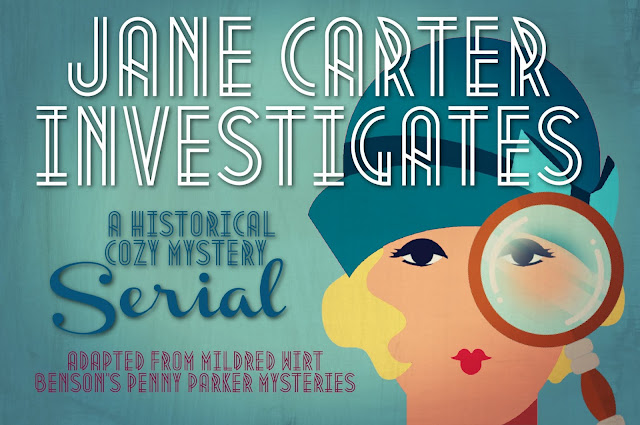Jane Carter Investigates Episode One-Hundred and Thirty-Five
“Paul Firth,” murmured Florence. “Can
there be any doubt that he is the customer Ellis Pruitt meant?”
“Not in my opinion,” I said.
“Isn’t it possible that he went into
the shop to have a photograph taken or for some other reason?”
“Possible but not probable. No, Flo, we
should have guessed long ago that Firth is an ex-sailor. It’s all becoming
clear now.”
“Then I wish you would explain to me.”
“Don’t you see? Anchor Jim, Richard
Hamsted, Paul Firth, and probably a fourth man must have been good friends at
one time. They had their tattoos with that phrase, All for one, one for
all, printed on their backs. Then Firth must have done something which made
the others angry. They followed him here to get even with him.”
“What makes you think that?” Florence
asked.
“Anchor Jim gave us a good broad hint.
We know that he and at least one other man have been spying on the Willows.”
“What can Firth have done to offend
them?”
“I can’t guess that part,” I admitted.
“And another thing, why should Firth decide to have his octopus tattoo
removed?”
“And who pushed Richard Hamsted off the
bridge?” Florence added. “We’re as much in the dark as ever.”
“Not quite,” I said. “I feel that if
only we could get into that storm cave, we might learn the answer to some of
our questions.”
“You’re not thinking of investigating
it tonight?”
“No. I’m practically a human icicle.
It’s home and into a hot bath for me.”
There was nothing more to be learned by
waiting, so we returned to Bouncing Betsy. As we motored toward Florence’s
home, we discussed various angles of the baffling case. The fact remained that
Paul Firth’s reputation in Greenville was excellent, while Anchor Jim and
Richard Hamsted appeared to be persons of questionable character.
“You never learned why Jim was wanted
by the authorities?” Florence inquired, alighting at her doorstep.
“No, I haven’t seen Mr. Mortimer since
that day at the cottage. I’m reasonably sure Jim Loewen is still at liberty.”
“He may be the one at the bottom of all
the trouble,” declared Florence. “We tend to suspect Firth of evildoing because
we dislike him so heartily for his disagreeable personality.”
“That’s true, Flo. The best way is to
have no opinions and wait for the facts, but waiting wears me to a frazzle.”
After I left the Radcliffs’, I did not
drive home. Instead, I turned into Drexel Boulevard, and to the Robertses’
home.
The door was opened by Marcus Roberts.
I had not expected to meet the former publisher. Somewhat confusedly I inquired
for Henrietta.
“My daughter isn’t here right now,”
replied Mr. Roberts. “I expect her home within a few minutes. Won’t you wait?”
“No, thank you,” I said. “I’ll drop in
some other time.”
“I wish you would stay,” Mr. Roberts
urged. “I find an empty house so depressing.”
I hesitated, and then followed the
former publisher to the same shabby living room where I had conducted my
painful interview with Henrietta. Mr. Roberts had been reading the newspaper.
He swept it from a chair so that I could sit opposite him.
“Tell me how you are getting on with
your All-Story Weekly,” he said.
I talked entertainingly, relating the
various difficulties which beset a fledgling publisher.
“I’ve even received threatening notes,”
I said. “Or rather, one. I think it was left on my desk by a man named Paul
Firth.”
“Firth?” Mr. Roberts’ face darkened.
“Yes, do you know him?” I watched the
publisher’s face.
“Only by reputation. He’s a scoundrel!”
Mr. Roberts’ voice rose.
“Can you tell me anything definite
against him?”
“No—no, I can’t. I only advise you to
have nothing whatsoever to do with him.”
The telephone rang, and Mr. Roberts
arose to answer it. During his absence, I tried to decide what to do next. Dare
I mention the clipping which I had found in the publisher’s old desk? I did not
wish to antagonize him, yet there were many questions I longed to ask.
Mr. Roberts returned, and I decided to
risk his anger.
Casually, I introduced the subject by
mentioning that I was using his former office and desk as my own.
“Yesterday, I came upon a clipping
caught beneath the lower drawer,” I said. “It concerned a man named Marcus
Jewel. He bore a striking resemblance to you.”
The publisher’s hands gripped the chair
arms so hard that the knuckles became a bluish white. Splotches of red appeared
on his forehead.
“Marcus Jewel?” he murmured at last.
“Yes, Mr. Roberts, but you have nothing
to fear from me. I shall not expose you.”
“Then you know?”
“The likeness was unmistakable. I read
the clipping, too.”
The publisher arose, nervously walking
to the fireplace. His hands trembled as he rearranged the dusty ornaments on
the mantelpiece.
“I searched everywhere for that
clipping when I cleaned out my desk,” he mumbled. “I’ve gone through every
imaginable torture fearing it would be found. And now I am to be exposed!”
“But I assure you I have no intention
of telling anyone,” I said. “Your past is your own.”
“A man’s past never is his own,”
responded Mr. Roberts bitterly.
“I shouldn’t have mentioned it. I hoped
I might be able to help you.”
“You haven’t told Henrietta?”
“No, nor any other person.”
Mr. Roberts’s tenseness relaxed
slightly. He paced across the room and back, then stood before me and looked me
in the eye.
“All my life,” he said very quietly, “I
have tried to spare Henrietta the knowledge that her father was—a convict. I haven’t
much to offer, but I’ll give anything within reason to keep the story out of
the paper.”
“You don’t understand,” I said. “I have
no intention of telling anyone. I’m running an All-Story Weekly, not a newspaper. We print pure works of fiction.
Furthermore, I have no thought of taking the story to the Examiner. I want nothing from you. But I do wish you would tell me
the true story. I am sure there were extenuating circumstances.”
Mr. Roberts sagged into an armchair.
“None,” he said. “None whatsoever. I
used money which did not belong to me. My wife was desperately sick at the
time, and I wanted her to have the care of specialists. She died while I was
serving my sentence.”
“You did have a compelling reason for
taking the money,” I said. “You should have been granted a pardon.”
“A theft is a theft. When I left
prison, I made a new start here, and devoted myself to Henrietta, who was still
a little girl then.”
“How old was she?”
Mr. Roberts gave no indication that he
heard the question and continued talking.
“The truth has been concealed from
Henrietta. She believes that I was abroad during those years I spent in prison.
Here in Greenville, I prospered, and people were kind to me. I made a great
deal of money, and I made it honestly. The future was very bright until a year
ago.”
“Then you gave up your newspaper,” I
said. “Why?”
“Can’t you guess?”
“Blackmail?”
Mr. Roberts nodded.
“One day a man came to me, a man I had
known in prison. He threatened to expose me unless I paid him a large sum of
money.”
“And you agreed?”
“I did.”
“Wasn’t that rather foolish? People
would have been charitable if you had admitted the truth.”
“I considered it from every angle,
particularly from Henrietta’s standpoint. I gave the man what he asked,
although it cost me the Morning Press. But that was not the end.”
“He still hounds you?”
“Yes, I’ll pay as long as I have a
dime. I’ve thought of taking Henrietta and going away, but he would trace me.”
“Who is the man, Mr. Roberts?”
“I can’t tell you.”
“Is it either Anchor Jim Loewen or Paul
Firth?”
Mr. Roberts’s face did not alter.
“I can’t tell you,” he repeated.
“I wish you would talk to my father,” I
said after a moment. “He might be able to help you.”
“No,” returned Mr. Roberts, growing
agitated again, “you gave your promise that you would not tell anyone what you
know.”
“Of course, and I’ll keep it,” I said.
“It does seem to me, though, that the easiest thing would be to admit the truth
and be rid of the man who robs you. Henrietta would understand.”
Mr. Roberts shook his head.
“I have made my decision,” he said. “As
long as I can, I shall abide by it.”
There was nothing I could do but bid
Mr. Roberts good evening and leave the house. His secret troubled me. If he had
been entirely truthful with me, it seemed very foolish of him to meet the
demands of a blackmailer. I wondered if there were aspects of the case which
Mr. Roberts had kept from me.
I pulled Bouncing Betsy into our
driveway and jumped out to open the garage doors. I was startled by a man who
had been sitting on the back doorstep of the house. He got up and came toward
me. His face was hidden, but I knew it was not my father. It was not Jack,
either.
“Who is it?” I called out uneasily.
“It’s Harry, Mrs. Carter. I’ve been
waiting for you.”
“What brings you here?” I asked,
hurrying to meet him. “I hope nothing bad has happened at the Press building.”
“Everything’s fine there, but I’ve got
a letter here that I thought you would want to see right away. Found it tonight
when I was sweeping up. It answers a lot of questions you’ve been askin’.”
I took the paper from Harry’s gnarled
hand.
“Not about Marcus Roberts?” I asked.
“Read it and you’ll see. Roberts was
blackmailed just as I always thought. And by the man who signed this letter.”



EPISODE 135 WILL NOT GO TO ONEHUNDRED THIRTY SIX, IT WILL NOT LOAD! I CAN GO FROM 135-137, BUT NOT 136!
ReplyDelete